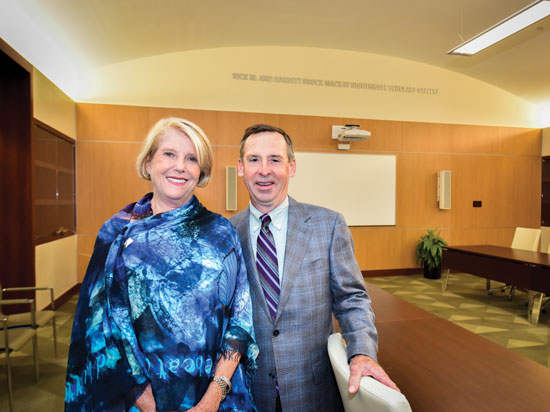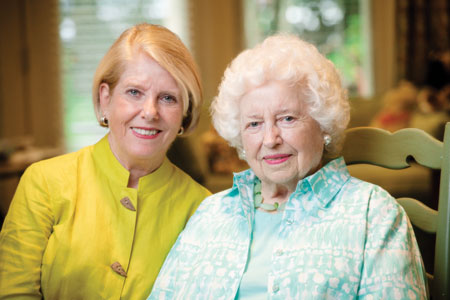
By Brett Balley and Jennifer Lollar
Florence Nightingale is the founder of modern-day nursing and left countless gifts to nursing and health care.
Some of those gifts include 48 letters donated to UAB to establish the Reynolds Historical Library in 1958. These letters were written between 1853 and 1893 when Nightingale was between the ages of 33 and 73 — a time when not much is known about her life. They cover topics including hospitals, health care, nursing matters, sanitary conditions and charitable contributions, and include correspondence with renowned physician J. Gillham Hewlett, MD, a health officer and later a sanitary commissioner in India, and with Madame Julie Salis-Schwabe, with whom she discusses war-relief efforts and charitable contributions for the Franco-Prussian and Austro-Hungarian wars.
These letters are at the heart of the Florence Nightingale Letters Initiative, a vision of UAB School of Nursing Dean and Fay B. Ireland Endowed Chair in Nursing Doreen Harper, PhD, RN, FAAN, to publicly showcase the important work of Florence Nightingale and provide an effective teaching tool and catalyst for continued nursing and health care research.
With gifts from Board of Visitors member Arlene Henley and the Delia and John Robert Charitable Trust, the School digitized, transcribed and published the letters online but did not have a permanent public forum until alumna Barrett Brock MacKay (MSN 1979), her husband, Rick, and her parents’ foundation — the Harry B. and Jane H. Brock Foundation — donated the lead gift to name the Barrett Brock MacKay Florence Nightingale Exhibit. This interactive exhibit on the first floor of the UAB School of Nursing showcases the letters and highlights Nightingale’s contributions to modern health care and evidence-based research.
“These letters are a wonderful tool for inspiring students,” MacKay said. “They can teach students about critical thinking and show them how nursing is so fundamental to the quality of life and health in a country. Nursing was a true, true calling for Nightingale, and what she did a hundred years ago is still relevant today. She was brilliant.”
In 2015, Rick and Barrett MacKay again partnered with her parents’ foundation to make another gift to name a dynamic new multi-purpose “gallery” on the light-filled main floor of the School’s expansion. The venue will serve as a hub for the School’s scholarly activity to document nursing history, showcase current global initiatives, and provide much-needed space for educational seminars, collaborations, lectures, dissertations and community gatherings. The MacKays hope the Rick M. and Barrett Brock MacKay Nightingale Scholars Gallery will inspire students and faculty to use nursing to make life better for people around the world.
“We have seen how the Nightingale Letters have motivated students and faculty, and we wanted to do something even more impactful that could expand the reach of Florence Nightingale and her message, as well as that of one of the top nursing schools in the country,” MacKay said.
Inspired by her daughter’s passion for nursing, the UAB School of Nursing and Florence Nightingale, Barrett MacKay’s mother, Jane Brock, has now made a personal gift to establish the Jane H. Brock-Florence Nightingale Endowed Professorship in Nursing and the Florence Nightingale Endowed Award for Scholarly Work. These endowments will help fulfill and sustain the vision of bringing Nightingale’s influence into all aspects of nursing education at UAB.
“We will all, at some point in our lives, be recipients of nursing care,” Brock said. “Supporting this prestigious School of Nursing helps assure that the nursing care we receive will be of the highest quality.”

The professorship will support faculty members whose leadership and work focuses on building clinical and educational partnerships to improve access to quality health care and ultimately, the health and quality of life for underserved, poor and vulnerable populations.
The award fund will be used to provide pilot funding or other financial assistance to one or more faculty members and nursing students each year to advance their scholarly work, community outreach, clinical partnerships or participation in innovative learning opportunities.
MacKay says that she and her mother have been inspired to give not only by Florence Nightingale’s contributions to nursing and public health, but also by Harper’s vision.
“Establishing the Jane H. Brock-Florence Nightingale Endowed Professorship in Nursing will assure that the Nightingale spirit lives on through the recruitment or retention of a faculty member who is a nationally-known expert and leader and who exhibits Nightingale-like qualities of scholarly work, partnership development and the tireless pursuit of improving the health care of vulnerable populations,” MacKay said.
Harper said the support of the MacKay and Brock families has been central to the continued success and evolution of the Florence Nightingale Letters Initiative.
“Not only does it help us continue to build on the legacy of Florence Nightingale’s contributions to nursing science and population and patient care, the endowed professorship and program support funds will continue to inspire and innovate the work our school continues to do to improve the health of the vulnerable population groups in Alabama and beyond — today and for generations to come.”